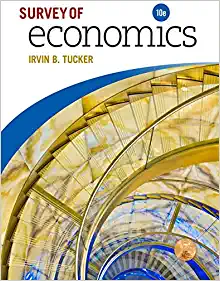Question
Please give a short answer to each question. Chapter 16 1. What distinguishes money from other assets in the economy? 2. What is commodity money?
Please give a short answer to each question.
Chapter 16 1. What distinguishes money from other assets in the economy? 2. What is commodity money? What is fiat money? Which kind do we use? 3. What are demand deposits and why should they be included in the stock of money? 4. Who is responsible for setting monetary policy in the United States? How is this group chosen? 5. If the Fed wants to increase the money supply with open-market operations, what does it do? 6. Why don't banks hold 100-percent reserves? How is the amount of reserves banks hold related to the amount of money the banking system creates? 7. Bank A has a leverage ratio of 10, while Bank B has a leverage ratio of 20. Similar losses on bank loans at the two banks causes the value of their assets to fall by 7 percent. Which bank shows a larger change in bank capital? Does either bank remain solvent? Explain. 8. What is the discount rate? What happens to the money supply when the Fed raises the discount rate? 9. What are reserve requirements? What happens to the money supply when the Fed raises reserve requirements? 10. Why can't the Fed control the money supply perfectly? Chapter 17 1. Explain how an increase in the price level affects the real value of money. 2. According to the quantity theory of money, what is the effect of an increase in the quantity of money? 3. Explain the difference between nominal variables and real variables and give two examples of each. According to the principle of monetary neutrality, which variables are affected by changes in the quantity of money? 4. In what sense is inflation like a tax? How does thinking about inflation as a tax help explain hyperinflation? 5. According to the Fisher effect, how does an increase in the inflation rate affect the real interest rate and the nominal interest rate? 6. What are the costs of inflation? Which of these costs do you think are most important for the U.S. economy? 7. If inflation is less than expected, who benefitsdebtors or creditors? Explain
Step by Step Solution
There are 3 Steps involved in it
Step: 1

Get Instant Access to Expert-Tailored Solutions
See step-by-step solutions with expert insights and AI powered tools for academic success
Step: 2

Step: 3

Ace Your Homework with AI
Get the answers you need in no time with our AI-driven, step-by-step assistance
Get Started


